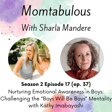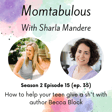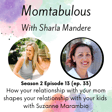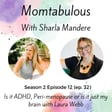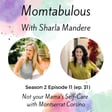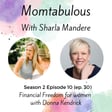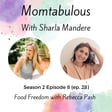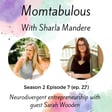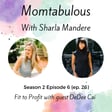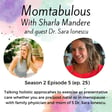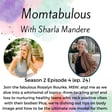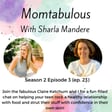Become a Creator today!Start creating today - Share your story with the world!
Start for free
00:00:00
00:00:01

How to find balance as a high achiever and avoid burnout
Let's be real moms - burnout is real. Life is overwhelming.
Join me and Amanda Balcombe, a financial advisor and recovering perfectionist turned Health and Mental Fitness Coach as we talk about how we are conditioned to strive for perfection and how that leads moms to burnout - and how we can change the narrative in ourselves so our kids avoid the stress-burnout cycle.
Find Amanda here -
Website: https://www.stillwellness.au/
LinkedIn: https://www.linkedin.com/in/amanda-balcombe-2b0179102/
Instagram: https://www.instagram.com/stillwellness_amandabalcombe/
Transcript
Introduction to Amanda Valkom and Her Journey
00:00:01
Sharla Mandere
Hello and welcome back to Mom Tabulous. I'm Sharla Mandare and with me today is Amanda Valkom. I hope I said that right. She is the founder of Still Wellness and is a health and mental fitness coach who specializes in stress management,
00:00:16
Sharla Mandere
burnout, and mental well-being. As a former award-winning financial advisor advisor, she is also a certified health coach and a professional member of the Health Coaches Australia and New Zealand Association, and she holds a diploma of positive psychology and well-being, an advanced certificate of mental health, and is a former certified financial planner with an advanced diploma of financial services.
00:00:41
Sharla Mandere
With a deep commitment to empowering others, Amanda uses the latest evidence-based lifestyle medicine, positive psychology tools, accompanied by coaching techniques to help her clients find balance and vitality in their fast-paced lives.
From Burnout to Wellness Coaching
00:00:57
Sharla Mandere
Woo, I love this. but oh well Did I pronounce your last name right?
00:01:00
Amanda Balcombe
Thank you, it's great to be here.
00:01:05
Sharla Mandere
Did I get it right?
00:01:05
Amanda Balcombe
You did pretty well, yes.
00:01:07
Sharla Mandere
It's like man-dare. Nobody gets man-dare right. I'm always like man-dare.
00:01:12
Amanda Balcombe
Yeah, yeah.
00:01:14
Sharla Mandere
Okay, so we were talking and you went from financial advisor into the health and mental fitness coaching because you experienced a burnout of your own, right?
00:01:25
Amanda Balcombe
Yeah.
00:01:25
Sharla Mandere
So talk me through that. right
00:01:28
Amanda Balcombe
Yes. So um my previous career, I was a financial advisor and I'd been doing that for about 17 years and I loved it. I loved building relationships with people. However, we had the pandemic and we were all working from home. And for me, that meant longer hours. And I really missed my team. I'm a people person and I missed being around people.
00:01:53
Amanda Balcombe
So I know that I started to work longer hours. And then when we got back into the office, there'd been some changes in my company around how they serviced clients. So my clients were used to coming in because I live in a rural town in Australia. And my clients were used to coming into the office and and talking to the ah customer service girls and them knowing their situation. So it moved to a call center, so less personal. And my clients started to get a little bit upset. So I then sort of jumped in and became the middleman as well as doing my financial advising. So I added extra workload there. But what I also realized is that it wasn't how I wanted to service clients. So there was a real mismatch in values between myself and the organization at the time. um And not that there was any right or wrong with what they decided. It was just how I wanted to operate. And as with burnout, a mismatch in values can absolutely
00:02:51
Amanda Balcombe
be a contributor to burnout. um And then the other part to that was I am a high achiever. So I kept pushing myself to keep achieving. We had high volumes and I know sort of the three months leading up to it, I started experiencing all these symptoms. you know I was um really fatigued. Normally I'd get up in the morning and I'd do my morning routine routine, go for a walk with my husband,
00:03:19
Amanda Balcombe
um And then I started waking up in the middle of the night. I started getting headaches and I'm a pretty active and healthy person. And I remember I was bursting into tears before work and I was sort of like, going God, what's wrong with me? You know, I'm a real copa. I just get on with things. And, um, yeah, I just started to feel really unwell by the end. I was sort of going, Oh my gosh. And I remember one morning my husband and I were getting our morning coffee and I burst into tears and I said, I just can't do this anymore.
00:03:49
Amanda Balcombe
And he said, well, you know, he supported me, thankfully. And I ended up resigning from my job and um I just
Understanding Burnout and Stress Management
00:03:59
Amanda Balcombe
left. I didn't take my sick leave, not a great decision from a financial planner. And yeah, I, um I ended up leaving my job and then making a decision to leave a career that I'd loved, but I, I needed time. I needed to take time out to heal and recover. And that was a really big wake up call and As I was recovering, I'd made the decision. I'd been really passionate about health for a long time. And I decided to retrain to become a health and mental fitness coach and really support other women like myself that were, um you know, struggling with stress, heading towards burnout, no work-life balance, ah because I felt really passionate about that. I think there was not a lot of education. I remember calling my boss. He didn't really know what burnout was.
00:04:47
Amanda Balcombe
And umm yeah, I'm really passionate about creating that awareness around burnout. And I think the other thing during that time that I was recovering, I also got a cancer diagnosis. And I think you know with when stress becomes overloaded, ah it can lead to that burnout and chronic disease. And that sort of, I guess, spurred me on you know further to really get out there, help people, support women,
00:05:17
Amanda Balcombe
and create more awareness around what burnout and chronic stress can do to you.
00:05:23
Sharla Mandere
Yeah. Wow. and And I mean, you know, I've said many, many times, like, if you don't slow down and if you don't take care of yourself, life will force you to.
00:05:33
Sharla Mandere
Right. And it sounds like you had the burnout and the cancer diagnosis and life was like, take care of you.
00:05:34
Amanda Balcombe
ah
00:05:41
Sharla Mandere
Right. And so kudos to you for listening because alone, listen, you know, or aren't able to, you know, whenever that kind of thing happens.
00:05:51
Sharla Mandere
But, um you know, it's good that you were you had the the ability, right, to be able to take a step back and, and change, change the career path and focus and take care of you.
00:05:58
Amanda Balcombe
yeah
00:06:03
Sharla Mandere
And so you're healthy now.
00:06:05
Amanda Balcombe
I am. I'm i'm super lucky. I got the cancer diagnosis early, um but you're exactly right. I was forced to stop and really reevaluate my life and learn, I guess, some hard lessons and decided that I wanted to, you know, create more balance in my life.
00:06:15
Sharla Mandere
Yeah.
00:06:22
Sharla Mandere
Yeah.
Perfectionism and Stress: Finding Balance
00:06:28
Amanda Balcombe
You know, I'd spent years running around after kids, juggling a career, I loved it all, but looking back now, I certainly could have put more strategies in place to manage my stress levels, but also understanding, I think, as women, you know, I've always been a high achiever, but I started to push myself past what was healthy, um that overachieving, that people-pleasing, saying yes to too many commitments, feeling like I had to, not wanting to let people down,
00:07:02
Amanda Balcombe
feeling the duty, you know, as a ah daughter um or a sister. And also, I think, you know, I see perfectionism is another issue with um women and that is another contributor to burnout or can be if we let it get um out of control and have unrealistic expectations that we just can't meet.
00:07:26
Sharla Mandere
Yeah, for sure. I mean, perfectionism has its purpose, right? It does it, it has having a place and it can absolutely help us strive for, for bigger, better, more things, but then it absolutely can take you down and cause I think a lot of women that have an anxiety also have this perfectionism.
00:07:30
Amanda Balcombe
Yeah, yes.
00:07:45
Sharla Mandere
Um, so, you know, I've certainly have had some of that, you know, growing up a dancer, you had to be perfect on everything. So, you know, I definitely have have struggled with the perfectionism thing too.
00:07:56
Amanda Balcombe
Well, it's funny, I'd absolutely relate with that because I was a gymnast. So you were always, you know, you were striving for a 10. So a perfect score, which is not realistic. So I'm a recovering perfectionist. Luckily I understood probably, you know, in my twenties that that doesn't provide any flexibility. There's nothing wrong with giving a hundred percent, but that your best is good enough as well so that you don't, you know, push yourself past healthy.
00:08:23
Sharla Mandere
Yeah, I try to avoid with my children's sayings like practice makes perfect, you know, and that kind of stuff is a really like sometimes I'll have to catch myself be like practice.
00:08:29
Amanda Balcombe
Yeah.
00:08:34
Sharla Mandere
is really good and will help you a lot. Stop myself, like practice is good. It'll help you. You'll feel better and more confident. We're gonna let go of perfect, right?
00:08:45
Sharla Mandere
Especially when you do anything live.
00:08:45
Amanda Balcombe
Yes.
00:08:47
Sharla Mandere
you know I've got a big background in theater and live theater. oh Something's always gonna go wrong. So we can't strive for perfect. um So how how do women like recharge our battery?
00:08:53
Amanda Balcombe
Yeah.
00:08:58
Sharla Mandere
And like, what do you how do you help women with all of that? So we don't no burn out.
00:09:02
Amanda Balcombe
yeah Yeah, I think um when i the women that I see, you know, they're struggling with stress or heading towards burnout or some are already there. So we can actually overcome it and reset our stress response. And I think, you know, a couple of things is really understanding that there's two types of stress. Stress is a normal part of the human experience.
00:09:26
Amanda Balcombe
um However, there's positive stress, which is functional and beneficial um for us. It helps us to rise to challenges, get things done, get out of bed in the morning. ah That's the good stress. But then when stress becomes excessive and we have prolonged exposure to it, so it um continues and it moves into that chronic phase.
00:09:49
Amanda Balcombe
That's when we can start to feel that fatigue or we get sick more often because our immune system is not functioning at its best. It can impact our you know mental health. We might feel more anxious or be irritable and angry. So, you know, there are those two types of stress. And I think what I've learned is that um over the course of our day, we're really busy that um we need to build more recovery into our day. Sometimes it's not too much stress.
00:10:17
Amanda Balcombe
it's actually we're not building enough rest and recovery. So a couple of things in how I help my clients is first of all, it's getting back to what's most important, what matters in your life, what are your values? And I think when we're you know juggling that career with children, we become disconnected to that. We forget about what actually is important. And I think when we anchor back to those values,
00:10:44
Amanda Balcombe
we can make better decisions around our self care and our health. So the other part too is, as I spoke about, is the rest and recovery. I think as women, we don't give ourselves permission to stop, to rest and recover. You know, we feel guilty or we think we're going to let somebody down or we should be doing something else. And The way that our bodies are actually designed is, I don't know if you've heard of the ultradian performance rhythm. Yeah, it's the natural energy cycle that we have. And basically it's a 90 minute cycle of focus and effort and then followed by a 20 minute recovery. So we're not meant to sort of wake up in the morning, you know, switch the on button, go all day and then switch it off before we go to bed. We're actually need to take
00:11:39
Amanda Balcombe
you know, micro recovery breaks throughout the day, which helps to really reset the stress response and offload what I call some of our stress rocks. You know, over the course of the day, if we' if you imagine we've got a backpack on and as we go about our day, we're collecting rocks, whether it's good or, you know, healthy or unhealthy stress. But that micro recovery moments in our day help to offload some of those stress rocks. They help us to cope.
00:12:07
Amanda Balcombe
and keep us more in that healthy stress response.
00:12:11
Amanda Balcombe
So yeah, really focusing on micro recovery. So building in those five minutes to 20 minute breaks. And I know as moms, we don't have a lot of time. So
00:12:11
Sharla Mandere
Yeah.
Practical Stress Management Strategies
00:12:22
Amanda Balcombe
even five minutes matters or even a minute, you know, whether that's, um you know, when you first wake up in the morning, if you give yourself 10 minutes, that could be journaling, it could be meditating.
00:12:32
Amanda Balcombe
It could be a quick walk around the block if you have a partner that can you know have the kids while you do that. um Throughout the day, you know making sure you're eating healthy snacks, hydrating,
00:12:43
Amanda Balcombe
um taking you know doing some breathing exercises. So just making sure that you're taking those little breaks where you can just reset.
00:12:54
Sharla Mandere
Yeah, I love it. You know, and, and if you, you know, if, if, if your mom that is working or runs a business or anything like that's a productivity hack too, right? Is taking those like Brendan Burchard, who, you know, he's a high productivity business coach and they follow him and, you know, he's not a mom, you know, but he's a guy, but eba he, um, he says like all the, like the big billionaires, like Oprah, Richard Branson, all these people he's worked with, um, take a break every hour.
00:13:03
Amanda Balcombe
Yeah.
00:13:24
Sharla Mandere
on average between five and 15 minutes and so they set a timer and he's like if you're in the middle of an email in the middle of a sentence when that timer goes off just stand up even just doing a shake a walk around the block like you said go to the bathroom get some water go to the water cooler do but you know take a walk around the office like give your because you're you're more productive right and I think as moms we have this like
00:13:36
Amanda Balcombe
Yeah. Yes.
00:13:47
Sharla Mandere
long list, my to-do list every day, especially as in working from home, you know, is like, I've got this call and I've got this meeting and I've got this, my time to write my book and my time to edit the podcasts and all of these things.
00:14:00
Sharla Mandere
And then there's laundry and there's, and I'm and i'm homeschooling one child's and and she needs lunch and she needs, you know, I mean, they make the school lunches and, you know, the, the mom list and the work list and the laundry is never ending.
00:14:01
Amanda Balcombe
yeah
00:14:13
Sharla Mandere
And, you know, so So those lit, you know, if you don't give yourself the breaks, you know, then you can't need to push through that list is just it's that's when the little I call it like a micro burnout right in the middle of the day when you get that slump, where you're like, i'm I'm so done, but I have to push the take a break, right?
00:14:18
Amanda Balcombe
Yeah. Yeah.
00:14:34
Sharla Mandere
Take the breaks because for sure, like, and then those those little burnouts add to the big burnout. So yeah.
00:14:41
Amanda Balcombe
And that's exactly right. And I know, you know, from my previous experience, I would just push through, I just get up and keep going and I've got to get this work done. Or, you know, I've got to do um the washing and and get the kids organized. You know, you just keep ah pushing and you don't give yourself, I guess, that grace to go, actually, I can just take five minutes. I'm just going to sit and have a cup of tea. Or, yeah, I'm just going to just do some breathing just to to reset. So I think as mums, that is really important.
00:15:16
Amanda Balcombe
um to really do those micro breaks throughout the day. But I also think to being able to set some boundaries and not overcommute.
00:15:25
Sharla Mandere
Yeah.
00:15:27
Amanda Balcombe
You know, I think saying no is not easy. We don't want to disappoint people or let people down. And I think as moms, you know, one of the feelings we have a lot of is guilt.
00:15:38
Amanda Balcombe
And what I've learned is that if we come back to what's most important to us, it's easier to set that boundary and hold it when we anchor back to our values. And I think also trying to you know learn to say a quick no and a slow yes, and just creating that pause before we say yes. you know I'll check my schedule and come back to you and and you can go and check your capacity. you know When you're at capacity, don't say yes. you know um But if you do have the capacity, then you're able to do it. But I think we often
00:16:12
Amanda Balcombe
you know, are too quick to say, yes, oh, we can do that. I can take that on um when we might be actually at capacity and we need to actually say no and just take a step back.
00:16:23
Amanda Balcombe
As you said, slow down, you know, reset the nervous system, recharge the batteries and then, you know, come back.
00:16:28
Sharla Mandere
Yeah.
00:16:32
Sharla Mandere
Yeah, I think maybe stereotypically, women more than men are the people pleaser, right? and And we have a harder time saying no.
00:16:41
Amanda Balcombe
Yes.
00:16:41
Sharla Mandere
And I just one thing I talk about all the time, too, is like, when you're saying no, to someone else, you're saying a yes to yourself or a yes to the thing you need, to right? When you're saying yes to someone else, it's a no, now I don't have time for this thing that
00:16:51
Amanda Balcombe
Yep.
00:16:55
Sharla Mandere
that I need to do or want to do or it comes up or whatever. um And I saw a post um the other day and I think it was Molly Gail Braith posted it and she was talking about, she had reached out to someone about something and her response was, my plate is as full as I would like it to be right now, but thanks for thinking of me.
Making Choices and Setting Priorities
00:17:22
Amanda Balcombe
Yeah.
00:17:22
Sharla Mandere
There was no like, I'm sorry.
00:17:24
Sharla Mandere
There was no, um well, maybe at another point in the, it was, and I thought that was such a great response. And that was the point of her post was like, what a great way to like say no to someone is my plate is as full as I would like it to be right now, or as I need it to be.
00:17:31
Amanda Balcombe
yes
00:17:40
Sharla Mandere
My plate is as full as I want it. My plate is as full as I need.
00:17:46
Sharla Mandere
Thank you.
00:17:46
Amanda Balcombe
Yeah, such a great response.
00:17:48
Sharla Mandere
He was like, oh, that was kind of it. I was like, I've started saying that. You know, my plate's as as I can handle it.
00:17:53
Amanda Balcombe
Yeah, yeah.
00:17:56
Sharla Mandere
And my plate is as full as I like it to be right now. But thanks.
00:18:01
Amanda Balcombe
Yeah, which I think is great as long as you can create that pause before you answer. Um, but I think having a something ready to go, uh, so that you can politely decline whatever it is that's being asked and you, you know, that you're at capacity.
00:18:06
Sharla Mandere
yeah
00:18:17
Amanda Balcombe
So I think that's a great way of replying.
00:18:19
Sharla Mandere
Yeah. I just had that that conversation with a friend too of like, you know, you can say no to this person that is asking you to do this thing that you really don't want to do.
00:18:24
Amanda Balcombe
Yeah.
00:18:26
Sharla Mandere
And it is stressing you out. Like you can say no. And she was like, I just feel so guilty saying no. And it's like, I know, but why don't we feel guilty when we say no to ourself, right?
00:18:33
Amanda Balcombe
Yeah.
00:18:38
Sharla Mandere
Like, do you feel bad that then you don't have, you're doing this thing that's stressing you out. It's causing you stress, but also you don't have the time to do these other things. So. made me feel guilty to yourself instead of guilty to someone who you don't have an obligation to.
00:18:52
Sharla Mandere
You can say no. you know And she was like, oh, and she did.
00:18:54
Amanda Balcombe
yeah
00:18:55
Sharla Mandere
And she felt better. And so that was so was good. So when we want to reignite like our spark, right if we're kind of getting through a burnout or ready ready ready to come out the other side, right how do we like, you talk about reigniting the spark and um in in you know letting go.
00:19:14
Sharla Mandere
right
00:19:15
Amanda Balcombe
Yeah, I think, you know, as part of when we're feeling that chronic stress, or we're in the burnout, our inner critic or our negative self talk become really loud. It's kind of like a megaphone, you know, when we're feeling at our best,
00:19:34
Amanda Balcombe
Our self-talk is like a whisper, you know, we're feeling good. and But one of the things that I notice is that that negative self-talk becomes really quite loud. So when we're working through the physical side of things, you know, the rest and recovery, we also need to be working on the mindset. So I think one of the big ways of, I guess, moving more into that reigniting the spark and finding joy and letting go is self-compassion.
00:20:03
Amanda Balcombe
So self-compassion is a real antidote to stress and burnout. And I think, you know, we tend to beat ourselves up if we can't get everything done or, you know, we we feel guilty, but we actually need to be kinder to ourselves. We need to say, hey, I'm doing the best that I can. And, you know, would we be talking to ourselves um the way, you know, the way that we talk to our friends, sorry, our best friend, would we actually speak to them like the way we're speaking to ourselves. And I think when that's a real light bulb moment for women, they're sort of like, oh my God, yeah, I actually do beat myself up. And when they start to be kinder to themselves, they do start to let go. They do start to go, hey, it's okay, I am doing the best I can. um And I think that's where coming back to what's most important and anchoring to those values helps you say yes to yourself.
00:21:00
Amanda Balcombe
more and not feel as much guilt. You're able to let go because you're very clear on what's important. It's not that you don't care about somebody else, but you're able to make
Self-Compassion and Mental Health
00:21:11
Amanda Balcombe
a different choice. And there's a really great tool that I use. It's called the choice point. You know, we make 35,000 choices a day, right? That's a lot of choices. And when you're clear on what matters to you and you're able to create, I guess that pause before you respond, you can decide to make a choice towards the person you want to be or the life you want to create, or you can make in a way decision a way you know make a choice that takes you away from the person you want to be and the life you want to create. So, for example, you know a mum saying yes to a commitment when they're at capacity means maybe they don't show up as the best mum for their children, maybe they're snappy
00:21:52
Amanda Balcombe
you know, because they're tired, they' they're at capacity, but they haven't realised that. So I think when we can actually work out what's important to us, and if that's our family, and we want to show up as the best mum we can for them, and rather than giving all our energy away to things that maybe aren't as important, we can make better decisions and better choices.
00:22:15
Sharla Mandere
Yeah, no, that's so, that's so true, right? Is like, if you notice yourself, like snapping at your kids, your husband, your, your partner, or whatever, it like your, your parents, your friends, right?
00:22:27
Sharla Mandere
That, that maybe, maybe you're hitting that, hitting that burnout, right?
00:22:27
Amanda Balcombe
Yeah.
00:22:30
Sharla Mandere
And you're like, I don't know why, I don't know why, but maybe you're just hitting that burnout. Um, yeah, yeah.
00:22:35
Amanda Balcombe
Yeah.
00:22:37
Sharla Mandere
And I love, I loved what you said about like, would you talk to your best friend this way?
00:22:40
Amanda Balcombe
Yeah.
00:22:41
Sharla Mandere
Right? Because we, We don't say the things out loud to other people that we say in our head to ourself, right? And I, you know, or or would you say it to your daughter if you have a daughter, children, your son, would you, would you say that to them?
00:22:51
Amanda Balcombe
Yes. Yeah.
00:22:57
Sharla Mandere
No, you wouldn't, you wouldn't, hopefully not.
00:23:00
Amanda Balcombe
Yeah, yeah, yeah.
00:23:00
Sharla Mandere
but If it's astounding, oh my God, no, I would never say that to my, to my like 14 year old daughter, like, Oh, well, what a way to give her a complex, right? Um, then maybe, you know, yeah, you don't want to be saying those things to yourself. We are the worst, worst critics for sure.
00:23:17
Amanda Balcombe
Yeah, and I think when we're stressed and burnout, that's when it actually gets amplified. So, you know, making decisions around your health, prioritizing your health,
00:23:29
Amanda Balcombe
and your mental health becomes more important to bring you back, you know, at your best where you're in good health again and um good mental health. Because if you stay in that burnout and stress state, you're not operating at your best.
00:23:45
Amanda Balcombe
And we tend to get down on ourselves.
00:23:46
Sharla Mandere
Hmm.
00:23:47
Amanda Balcombe
So starting to make decisions where um you are taking those breaks, you're doing things that um actually recharge your batteries, you're prioritizing your sleep, and one And another strategy is protecting you know the beginning of the day and the end of the day um for ourselves as moms and and doing something that in the morning you know sets you up for success, gives you some time to yourself before you have to give to everybody else. And then at the end of the day, um and what I've seen is that we often can be sort of sitting in that
00:24:22
Amanda Balcombe
um stress response or activated response in the evening. So taking some time to have that wind down routine, you know, not having devices an hour before bed so that you're starting to calm the nervous system, slow slow down, might be reading, taking a shower, um talking to your partner or your kids, just bookending the day so that you're you're taking a bit more time to do something that is, I guess, helping or serving your health.
00:24:53
Amanda Balcombe
rather than sabotaging it.
00:24:55
Sharla Mandere
Yes. Yes. I love, I love protecting bookending the day and just protecting yourself. It helps. It does help so much with that piece. And it's a good time to journal. Like you said, beginning the day, end of the day, I'm to journal a gratitude journal, all of that, to just help protect that, that piece right within you.
00:25:07
Amanda Balcombe
Yeah. Absolutely. And gratitude's a huge thing to, you know, switch your mindset. so When you are feeling, I guess, in that more stressed state, starting that gratitude practice is really important. It does reduce stress, but it gets you into that more positive mindset that, um yeah, you can feel more hopeful, have more positive um emotions, which really, I think helped to drive your decisions and um yeah, really start to shift your mindset. So I think that's super important. And I think too,
00:25:50
Amanda Balcombe
you know, we're connected to our phones. So not reaching for your phone first thing in the morning, because that's kind of that stress response, you know, checking emails or, um you know, scrolling social media. So doing, you know, instead of doing that, don't touch your phone for the first 30 minutes or hour of the morning, actually connect or, you know, do some self-care that is going to serve you more than looking at your phone.
00:26:20
Sharla Mandere
Yeah. So many experts talk about that too of like, don't don't open the phone first thing and definitely do your, you know, that's when I do my my my morning journaling and I grab my like energy drink that I make and I, you know, yeah, drink my water and, and you know, get all that, get all that done first, me first, right?
00:26:26
Amanda Balcombe
Yeah.
00:26:39
Amanda Balcombe
yeah yes Yeah.
00:26:41
Sharla Mandere
My workout. And then, you know, then it's like, okay, I can check the, see what other people want from me now.
00:26:49
Amanda Balcombe
Yeah. Yeah. and And how does that make you feel when you're able to have that sort of half hour or an hour to yourself? And then how do you shop for your family when you get to do that?
00:26:59
Sharla Mandere
Yeah. And it's, you know, setting that example for the kids too, whether they do it right now or not, if you have teenagers, you know, maybe their, their first thing in the morning, their rollover, they see their 27 messages on their phone that their friends sent them middle of the night. But you know, the, the, at least they're seeing you do it that maybe, maybe at some point as adults, young adults.
00:27:22
Amanda Balcombe
Yes, well, I have young adults and um I'm always like you, you know, I keep trying and and they have they have noticed that actually it's not great to be on their phone all the time and to have breaks. So it's good to see that actually sinking in and yeah they're not perfect. But the fact that they're aware, like it's really awareness, isn't it? That's where it starts.
Prioritizing Joy and Well-being
00:27:46
Amanda Balcombe
And they're starting to make different choices and decisions and taking breaks. Then That's exciting.
00:27:53
Sharla Mandere
yes like It's sinking in just a little, right?
00:27:56
Amanda Balcombe
yeah Yeah, just a little. It's like it's not all in vain.
00:28:02
Sharla Mandere
I love it. Well, this this has been so great. I loved i love hearing your story and i love I love how you took that really challenging time and that burnout and and totally flipped it on its head. And now you're helping women because moms do need, I do think we burn out more than, you know, even today I was getting gas in a Mom pulled her car up and ah and then I just heard her go, nope, nobody's getting out of the car.
00:28:29
Sharla Mandere
We're not. It was an instant like, nope. I was like, you know, and I just felt like, oh, I hope i hope you get to take a breath today. Like, ah you know, they're young.
00:28:37
Amanda Balcombe
Yes.
00:28:38
Sharla Mandere
Kids were young. and I think they were like, let's get out of the car at the gas station. She's like, not today. We're not doing it. Get back in the car.
00:28:44
Amanda Balcombe
Yeah. but And we can all relate, right? We've all been there, um you know, with kids and and it's busy and as much as you love them. um it's It's hard. The juggle is hard. And I think what I also help women do and what I realized I didn't do myself is that to give myself permission.
00:29:03
Amanda Balcombe
to prioritise my health and wellbeing. you know i I did put everyone else first all the time. and that we do, it's it is the whole oxygen mask.
00:29:14
Amanda Balcombe
you know If you're not looking after you, then you can't look after others and and be at your best.
00:29:16
Sharla Mandere
One.
00:29:20
Amanda Balcombe
And I think that's the big lesson that I've learned is that we actually need to do this to function at our best, to be you know the best mum or the best partner or work colleague and have the energy.
00:29:34
Amanda Balcombe
So if we don't do the self-care, we don't do the rest and recovery, we don't have the energy to do all the things that we wanna do. and And some of those things we want to be doing because they do reignite our spark or bring us joy, you know, I think is we don't do those activities. But even if we, you know, I'll send a bit of a challenge out to your listeners today to do one thing a week that they really love or brings them joy that they can schedule in and hopefully get a partner to support them or someone while they go and do something just for them.
Conclusion and Key Takeaways
00:30:07
Sharla Mandere
Yeah, I love it. That's a great challenge and a great, a great one to end on. So thank you so much, Amanda.
00:30:12
Amanda Balcombe
Yeah.
00:30:14
Sharla Mandere
This has been such a great conversation and I appreciate you being here. It's a totally different day in Australia right now. It's like morning for you and late afternoon for me.
00:30:22
Amanda Balcombe
Yes.
00:30:24
Sharla Mandere
and so And from the future to me.
00:30:28
Amanda Balcombe
Yes, yes, that's so true.
00:30:31
Sharla Mandere
Yeah. So I appreciate you being on and thank you so much for your time and all your wonderful tidbits and advice. And we will see you in the next episode.
00:30:40
Amanda Balcombe
Thank you so much for having me, Sharla. It's been great.

